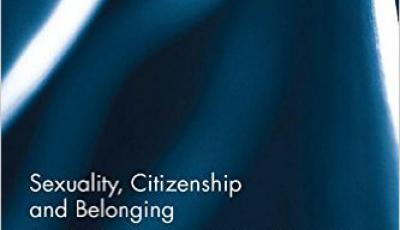Book Review: Sexuality, Citizenship and Belonging: Trans-National and Intersectional Perspectives
Posted:
Time to read:
Post by Brandy Cochrane, PhD candidate in Criminology at Monash University, Australia. Her work explores the experiences of refugee mothers in relation to border securitisation, citizenship, and everyday security. Brandy is on Twitter @brandy_cochrane.
Review of Sexuality, Citizenship and Belonging: Trans-National and Intersectional Perspectives edited by Francesca Stella, Yvette Taylor, Tracey Reynolds, and Antoine Rogers (Routledge, 2016).

The book contains an introduction by the editors followed by twelve chapters which have been divvied up into three sections: (1) the relationship between sexual citizenship, nationalism, and international borders; (2) sexuality and ‘race’; and (3) sexuality and religion. Although the book maintains a mostly European focus, the authors cover a number of geographical areas outside of the United Kingdom during their work, including India, Russia, Ireland, and Italy. The spaces of belonging examined are as diverse as the topics in this book with backdrops of the home, the asylum system, workplaces, queer clubs, the law, protests in the streets, and places of worship.
The first section, entitled ‘Sexual Nationalism and the Boundaries of Sexual Citizenship,’ covers a range of topics: nationalism and biopolitics in Russia, the Irish queer diaspora, LGBTQI rights to asylum, and the politics of LGBT international human rights’ NGOs. The connection between these chapters is the concept of sexual citizenship and the way it is deployed within/out of nations. Exploring ‘sexual democracy’ and humanitarianism bounded to ideals set by the EU, the initial section gives interesting insight into how a variety of actors use language and spaces to delineate borders around inclusion and exclusion.
The second section on ‘Racialised Subjects and Feminist/Queer Solidarities’ explores how black women’s sexuality is constructed, the shared activism between queer and migrant groups, ‘race’ in the context of lesbian clubs and LGBT asylum claims, and sexual political struggles in India in the context of colonialism. United by a theme of whiteness as the ‘invisible norm,’ the chapters comprising this section question how the issue of ‘race’ is sidelined within discussions of sexuality and citizenship. This section, the strongest of the three in terms of cohesion, uncovers how the norm of ‘whiteness’ has kept ‘race’ from being a part of discussions of sexuality and gender. By challenging the idea of citizenship within the context of race, the chapters weave together links of racism and marginalisation practiced by the so-called ‘civilised.’
In the final section of the book, ‘Sexuality, Religion, and Belonging,’ the chapters focus on young Christian lesbian experiences, voices within the church about LGBTQI issues, sexual norms for religious youth, and gender and sexuality within Buddhist movements in the UK. The thread which binds this chapter together is the intersections between sexuality and religion, as religion is often associated with being a negative factor rather than a supportive influence around queer issues. Although discussions on religion and its intersection with sexuality could bring challenging discussions to citizenship, the chapters in this section focus mainly on ideas of belonging and norms within the religious experience.
For those interested in the border and border control, the several chapters in the collection stand out. Among other authors, readers will find Calogero Giametta’s examination of asylum procedures for LGBT claimants that focuses on production and presentation of ‘genuine’ biographies of victims to be of great interest. Another example is Maria Livia Alga’s chapter which centres on a conservative Italy to explore the ‘shared marginality’ of migrants and the LGBT community. These, among other chapters, help to shine a light on sexuality’s interplay with fortress Europe’s identity politics, which is often understudied in research and writing on border control.
Sexuality, Citizenship, and Belonging attempts to tease apart the recent importance placed on sexual freedoms as a pillar of humanitarianism by the EU and around the world. A very broad topic to attempt to address, the book’s sections do not always maintain a cohesive thread throughout. There was, at times, a lack of engagement with concepts of citizenship which limited ties with the topic that makes the collection as a whole best suited for those focused more on belonging and sexuality. Overall, however, the collection makes an important contribution to the literature on sexuality. Using a critical perspective, the book demonstrates how ideals of ‘sexual freedom’ which should give haven to those outside of the heteronormative hierarchy, can be used to oppress, control narratives, obscure factors, and define a specific Western identity for what it means to be an insider and what it means to be an outsider. The chapters bring interesting new perspectives to the discussion of ‘sexual nationalism’ and advances thinking on the intersections of sexuality, citizenship, race, religion, and belonging. Researchers in sexuality and gender studies will be well-served in reading this collection.
Any comments about this post? Get in touch with us! Send us an email, or post a comment here or on Facebook. You can also tweet us.
__________
How to cite this blog post (Harvard style):
Cochrane, B. (2016) Book Review: Sexuality, Citizenship and Belonging: Trans-National and Intersectional Perspectives. Available at: https://www.law.ox.ac.uk/research-subject-groups/centre-criminology/centreborder-criminologies/blog/2016/02/book-review (Accessed [date]).
Share:








